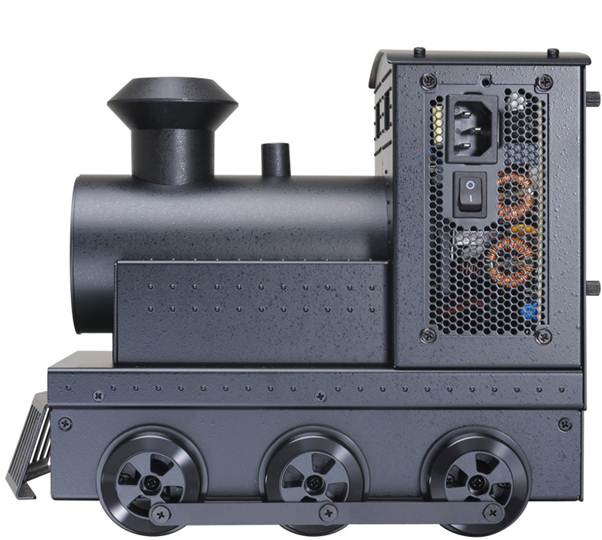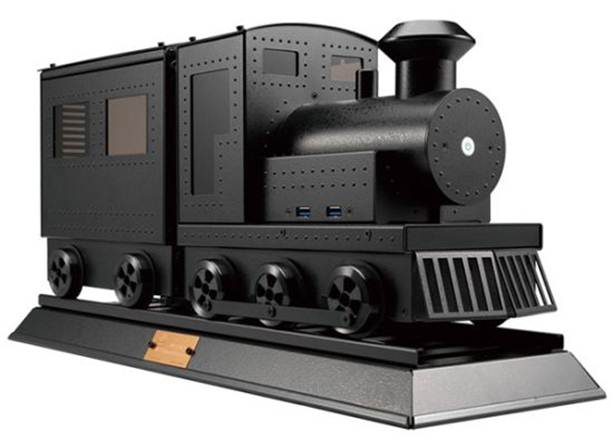The best motorized train PC case we’ve ever
seen
The first time we laid eyes on the PC-CK101
Was at the Computex trade show in Taiwan - it was pretty difficult to miss, in
truth, as it was chugging up and down the length of the Lian Li booth, drawing
double takes and inquisitive looks from everyone walking past.

Lian
Li PC-CK101P
If we’re honest, we’d written it off as a
publicity stunt - a concept case made by someone at the factory in their spare
time; a labour of love that was never designed for a full production run.
Imagine our surprise, then, when Lian Li got in touch to see if we’d like a
review sample sent to the Custom PC lab in London.
In its defence, Lian Li has a long history
of releasing outlandish cases - some of our more seasoned readers may remember
the PC-T1A, which was modelled on a spider and actually walked, and the company
is famous for its iconic line of nautilus- shaped cases too.
In the UK, the PC-CK101 is available in two
flavours: a static S model, with just the case and a display stand; and the
limited- edition P model, which adds a motor, axle assembly and atomiser (which
unfortunately Lian Li couldn’t provide for this review) for a realistic
chugging- smoke effect. The ambulatory P model that we’re reviewing here
currently retails for a monstrous $435, meaning that you’ll need to shell out
some serious notes for what is, after all, a novelty case. Thankfully, the S
model will reportedly retail for a far more sedate $240, although we couldn’t
find this model available to buy anywhere at the time of writing.
As you’d expect from a Lian Li case, the
body of the PC-CK101 is constructed entirely from pleasingly chunky slabs of
anodised aluminium. It’s incredibly well made too - all the joins are slick,
and there isn’t a hint of rattle or flex anywhere in the case.
Given that this case is obviously aimed at
model train enthusiasts, it seems appropriate that Lian Li ships the case with
a degree of assembly skill required. Detailed, if slightly difficult to follow,
instructions are provided, which guide you through the act of mounting the
electric motor, assembling and fixing the axles, and hooking them all up to the
battery pack that sits at the back of the train.

Imagine
our surprise, then, when Lian Li got in touch to see if we’d like a review
sample sent to the Custom PC lab in London.
Also in need of cabling is the natty
direction switch, which hangs out the floor of the train. This gets tripped by
lugs mounted on the end sections of track, reversing the motor’s drive, and
means that the case can happily run back and forth along whatever length of
track you’ve set up all day long. It is, of course, even possible to use the PC
while it’s running up and down the tracks, but you’ll need lots of room, and
long power, video and audio cables.
When we came to building a proper PC inside
the PC-CK101, we were impressed by the way Lian Li has made the best of the
space available. You can, for instance, secrete a slim line optical drive in
the front bumper of the train, while the dinky bundled 300W 80 Plus certified
PSU (suitably) plays the role of driver, sitting in the front cabin.
From here on, however, PC building inside
the PC-CK101 becomes a little tricky, as you have to stash your motherboard in
the rear carriage. This means all the PSU cables, front-panel cables, and the
cables for the two USB 3 slots that run down the side of the engine, have to
pass through a narrow channel between the bottom of the two carriages.

Also
in need of cabling is the natty direction switch, which hangs out the floor of
the train.
It’s a tight fit, and it makes building a
tidy PC in the PC-CK101 a challenge, especially when there are very few
hidey-holes in which to stash unwanted PSU cables. This isn’t automatically a
negative point - we enjoyed the puzzle and the chance to exercise our
cable-routeing skills, but it does make the build process take longer.
One type of cable you don’t have to worry
about, however, is the PCI-E power variety, as the PC-CK101 doesn’t have an
expansion slot to buddy up with the single PCI-E graphics slot that’s found on
many mini-ITX motherboards.
This is an unusual choice, as there’s room
on the rear of the case for a single expansion slot (although it would require
relocating the power switch), and it means you’ll be limited to on-board
graphics with a CK101 build. This isn’t the limit it used to be (we found AMDs
new Trinity APUs to be capable performers last issue), but it restricts
flexibility and future upgrades.
Performance
Cooling in the case is handled by a single
120mm fan strapped to the inside front of the rear carriage and pointed towards
the area in which the CPU cooler sits. It’s a simple arrangement, but the
cramped nature of the case means it isn’t very effective; the fact that this
single fan has to draw in air through the small gap between the carriages
doesn’t help either.

Cooling
in the case is handled by a single 120mm fan strapped to the inside front of
the rear carriage and pointed towards the area in which the CPU cooler sits.
During our testing, which was conducted
without a graphics card, we saw the CPU temperature peak at a delta T of 57°C -
significantly higher than other mini-ITX cases we’ve seen grace these pages.
Conclusion
We’d wager that you already know whether
you’re likely to buy the Lian Li PC-CK101, and what we say decision. You don’t
buy a case such as this because you want the best cooling or expansion
potential, but because it’s a PC IN A TRAIN! If this appeals to you then you’ll
be able to overlook the below-average cooling and cramped interior in favour of
having a unique-looking computer.
The Lian Li PC-CK101 isn’t technically the
best mini-ITX case available, but it’s well-made, has a one-of-a-kind design
and you can build a perfectly functional PC inside the chassis.
However, it’s also ridiculously priced. If
you’re going to buy one, it would be best not to let your other half know how
much it set you back.